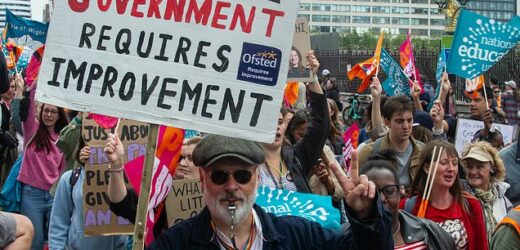DANIEL HANNAN: Public sector workers should rejoice at the new pay rise offer when the country is this skint
We have no money left. We spent it all during the lockdowns. Or, more precisely, we borrowed it from our future selves and we are now paying it back in the form of both higher taxes and lower wages.
Even if it were morally right for Rishi Sunak to go beyond the recommendations of the pay review bodies and give public sector workers what their unions demand (and, for reasons we shall come to, it is not) he has nothing in the kitty.
Government employees should rejoice at the awards just agreed. Their overall packages, when pensions are included, remain hugely generous.
Arguments over whether teachers, judges or prison officers ‘deserve’ an even bigger pay rise are beside the point. The Treasury must work within the limits of what it has. Private-sector workers have seen a substantial real-terms pay cut, despite being much readier than their public-sector equivalents to return to the office and raise their productivity.
It is true that the public sector, almost uniquely, still has large trade unions, which are able to make life difficult for the rest of us. Strikes by rail workers, teachers or doctors affect the nation in a way that walk-outs at a call centre, retailer or chain of pubs do not.
DANIEL HANNAN: Government employees should rejoice at the awards just agreed. Their overall packages, when pensions are included, remain hugely generous
But, to repeat, all this is irrelevant, because the country as a whole is skint. We cannot afford to borrow or tax any more.
Let’s spell out what these pay rises mean. The NHS is the single largest item of government expenditure, and 65 per cent of its budget goes on paying people. When you put up salaries for nurses (and the other NHS employees to whom nurses’ salaries are linked), you have less money to spend on other things, such as cutting waiting lists.
How much less? According to the Department of Health, for every percentage point in higher salaries, you hire 16,000 fewer nurses. Or, if you prefer, you carry out 500,000 fewer operations.
At a time when an almost unbelievable 7.4million people are on waiting lists, is higher pay really the priority? What goes for the NHS goes across the board. Every penny given in higher public sector salaries comes from somewhere. Either the rest of us must pay more in tax, or there must be cuts elsewhere.
At a time when taxes are already at a 70-year high, giving the public sector the settlement its unions wanted was impossible. ‘I’m not going to ask ordinary families up and down the country to pay an extra £1,000 a year to meet the pay demands of the union bosses,’ said Rishi Sunak, quite correctly.
DANIEL HANNAN: Private-sector workers have seen a substantial real-terms pay cut, despite being much readier than their public-sector equivalents to return to the office and raise their productivity
Which leaves the alternative of cutting other budgets to pay for higher salaries and pensions. Bit by bit, our government bureaucracies are ceasing to be service providers and becoming instead salary and pension providers.
When public sector unions talk of ‘protecting our public services’, they are being disingenuous. Paying teachers more means less money for renovating classrooms. Paying police officers more means fewer bobbies on the beat. Paying junior doctors more means longer waiting lists.
Indeed, giving junior doctors the 35 per cent increase they want would mean dropping any pretence that the NHS is primarily there for its patients rather than its employees. Not that the junior doctors are bothering to pretend. Their union suggested they went off to enjoy picnics after picketing.
It is true that inflation is high. Even a 6 per cent pay increase is simply keeping up with rising prices. But why is inflation so high? Who is responsible?
The short answer is that inflation surged because we spent the better part of two years paying people to stay at home, and covered the difference by printing money.
Indeed, the money-printing had already started. In 2008, the Bank of England launched its policy of ‘quantitative easing’ in response to the global financial crisis. It was intended as an emergency measure, but never turned off.
The amount of money in circulation has, incredibly, increased by 50 per cent since QE was launched 15 years ago. Half of this increase, no less than £400billion, happened after March 2020 as a way to fund the lockdowns.
DANIEL HANNAN: Giving junior doctors the 35 per cent increase they want would mean dropping any pretence that the NHS is primarily there for its patients rather than its employees
In other words, while we produced fewer goods and services, we printed vast amounts of extra money. You don’t need a degree in economics to understand that more money chasing fewer products means inflation. And who demanded the longest, strictest lockdowns? Who opposed every attempt to loosen the restrictions? Why, the very public sector unions that now complain about the consequent inflation. I despair at our refusal to accept even the most elementary economic facts. How did Rudyard Kipling put it?
‘In the Carboniferous Epoch we were promised abundance for all,
By robbing selected Peter to pay for collective Paul;
But, though we had plenty of money, there was nothing our money could buy,
And the Gods of the Copybook Headings said: “If you don’t work you die.”’
Let’s remind ourselves of a couple of basic truths. First, there is no such thing as a free lunch. If you feel that someone else ‘deserves’ a pay rise, you need to identify where it is coming from.
Second, in a world of finite resources, all politics involves trade-offs. Refusing a pay demand doesn’t make a minister greedy or selfish. On the contrary, a fiscally prudent minister is being unselfish, taking criticism on behalf of taxpayers, some of them still unborn, who will never express their gratitude.
Third, there is a limit to how much any country can squeeze the revenue-producing bit of its economy to expand the revenue-consuming bit.
Fourth, debts must be settled. Our national debt has now risen to more than £2.5 trillion. Your share of it is £36,000. Think about that when someone talks about whether it is ‘fair’ for state employees to earn even more.
Recall that four-fifths of government workers are still in gold-plated defined benefit schemes. If you work for the government, taxpayers top up your pension pot by 18 per cent of salary, compared with 6 per cent in the private sector.
Other than the junior doctors, most trade unions have called off their action. Perhaps they feel that their best tactic is to wait for a Labour government and then put in bigger demands. Depressingly, they are probably right.
On so many issues – NHS waiting lists, Channel crossings, inflation, tax rises – Keir Starmer’s tactic is to say as little as possible and let the Tories take the heat.
It is striking that Starmer, who opposed every loosening of the lockdown, now complains about the subsequent price rises , and is almost never picked up on it. Nor is he challenged on the extra borrowing he plans, or on what he would do to contain inflation.
Perhaps we shall have to wait until he is PM to find the answers. But I can tell you one thing now. We won’t like them.
Source: Read Full Article





